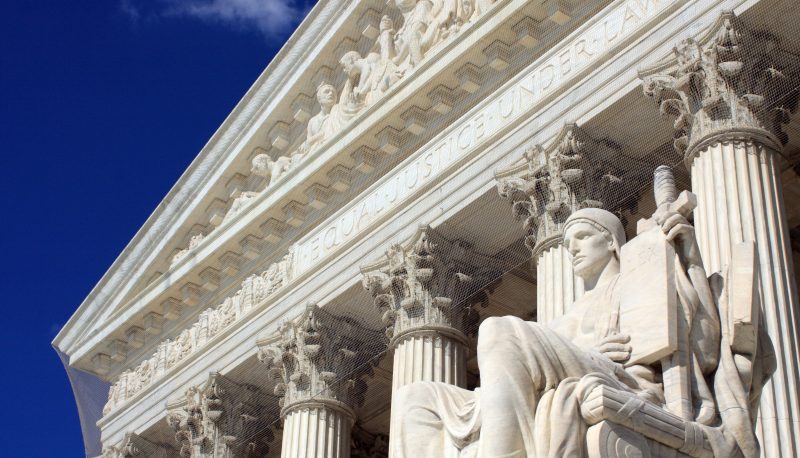“Confirmed Judges, Confirmed Fears” is a blog series documenting the harmful impact of President Trump’s judges on Americans’ rights and liberties. Cases in the series can be found by issue and by judge at this link.
As they have done previously, Trump Justices Neil Gorsuch, Brett Kavanaugh and Amy Coney Barrett cast deciding votes that granted a special exemption to churches and other religious institutions from state limits on indoor gatherings due to the COVID-19 pandemic, notwithstanding clear evidence of health danger. The February 2021 decision, which concerns California, was in South Bay United Pentecostal Church v. Newsom.
As with many other states, California has promulgated temporary restrictions on public indoor gatherings because of severe health risks due to the COVID-19 pandemic. As California health experts explained, the most serious risks are posed by such gatherings that bring together people “from different households” for an “extended duration” and that involve significant “verbal interaction” and “loud vocalization,” such as speeches and group singing. In areas in the state with the most severe pandemic conditions, therefore, California has temporarily prohibited indoor gatherings for worship services, concerts, plays, political meetings, and similar activities, as well as restaurants and bars. Activities like shopping are subject to less stringent restrictions, such as limiting people in a store at one time to 25% of capacity, because they involve “less close proximity” and for “less time.” In areas where indoor worship services are permitted with capacity limits, singing and chanting is not permitted.
Having previously lost a challenge to California pandemic restrictions as applied to them when Justice Ginsburg was on the Supreme Court, a group of churches led by the South Bay United Pentecostal Church (SBUPC) filed suit against the latest California pandemic restrictions related to indoor worship services. Lower courts rejected their challenges, so SBUPC sought review from the Supreme Court. SBUPC also sought an immediate remedy, asking the Court to issue an unusual order that would stay the lower courts’ rulings and eliminate the state’s restrictions while the Court considers whether to review the case on the merits.
In a ruling late last Friday night, the Court granted part of the relief SBUPC sought by a 6-3 vote, with Trump justices providing the deciding votes and suggesting they would do even more. In a brief unsigned order, the majority prohibited California from applying its temporary ban on indoor gatherings to SBUBC until the case is decided on the merits. The order allows the state to limit capacity to 25% and ban singing for now, but SBUBC can present “new evidence” to the district court that the state is not applying those limits in a “generally applicable manner” and seek an exemption from those restrictions as well.
Statements by the Trump justices made clear that some or all of them would go even further. Justice Gorsuch, joined by Justices Thomas and Alito, argued that the Court should have exempted the churches from all the COVID-related temporary limits. They asserted that California’s restrictions on “religious institutions” were improperly “more stringent” than on “many businesses,” comparing them to “train stations” and supermarkets and other businesses with “checkout lines.” Gorsuch also argued that the state did not show that it could not “address its legitimate concerns’ with less restrictive rules, such as social distance requirements. Gorsuch criticized the lower courts for failing to follow what he called the “extensive guidance” by the Court majority, made possible by the Trump justices, in the New York case on pandemic limits as applied to churches.
Gorsuch specifically argued that the Court should have exempted the churches from the limit on singing at indoor gatherings. The state had not proven, Gorsuch maintained, that the ban was “narrowly tailored”, since it could have allowed such activity accompanied by frequent testing or less than full congregation participation. He also asserted that the “entertainment industry” was being treated more favorably, since some evidence in the record “suggests” that movie and tv studios can allow some singing indoors. Chief Justice Roberts made clear that he saw “no basis in this record” for “overriding” the singing limitation. Justice Barrett joined by Justice Kavanaugh noted that SBUPC had not yet met its “burden” to show that the singing limit currently does not apply “across the board,” but effectively invited SBUPC to submit such evidence to the courts below.
Justice Elena Kagan strongly dissented, joined by Justices Stephen Breyer and Sonia Sotomayor, objecting to the “special exception” for worship services. Kagan explained that the record makes clear that California was treating such services “just as favorably as secular activities” that are truly comparable, like movie theatres and “political assemblies.” The majority’s insistence that the state treat religious services “like secular activities that pose a much lesser danger” like shopping, she went on, “defies our caselaw, exceeds our judicial role, and risks worsening the pandemic.” The majority was effectively reversing the long-accepted principle, she pointed out, that the “Constitution does not require things which are different in fact” to be “treated in law as though they were the same.”
Kagan also discussed the ample precedent that has made clear, until Justice Barrett replaced Justice Ginsburg on the Court, that the courts lack “the background, competence, and expertise to assess public health.” In this case concerning the deadly COVID-19 pandemic, she continued, it is “alarming” that the majority “second-guesses the judgment of expert officials” and “displaces their conclusion with its own.” The majority was making a dangerous “foray into armchair epidemiology,” she concluded, in which “science-based policy” is overruled by “judicial edict.”
This judicial edict made possible by Trump justices Kavanaugh, Gorsuch, and Barrett is likely not the last dangerous effort by these justices to create special exemptions for religion, in this case and elsewhere, even in the life-threatening context of COVID-19. We all “fervently hope,” as Justice Kagan wrote, that the majority’s “intervention will not worsen the Nation’s COVID-19 crisis.”

